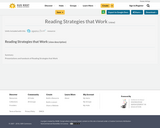
Presentations and handouts of Reading Strategies that Work
- Subject:
- English Language Arts
- Material Type:
- Activity/Lab
- Lesson
- Reading
- Date Added:
- 10/03/2018

Presentations and handouts of Reading Strategies that Work
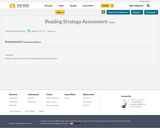
Various support resources for Reading Strategy Assessment.

Teaching our students how to use a variety of reading strategies is essential whether you teach in a face to face environment or remotely. This webinar will showcase the top reading strategies and supporting resources. In addition to sharing resources that can be used with your students, we will also share how these strategies can be used as reading interventions for students who are struggling (behind grade levels & EAL) during distance learning.
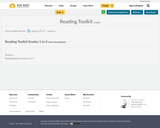
Reading Toolkit for Grades 1 to 3

This 20 minute tutorial shows teachers how to use Microsoft Reading Progress.
*available in over 100 languages

Please keep in mind that you can also use the paper copies of this to administer. If you are using the paper versions, you will need to adjust your administration accordingly.

A collection of hands on activities for ELA for preschool to grade 5.

At Crick Software we believe that too many children struggle with their learning due to their literacy difficulties. We created our products to overcome those difficulties, and we made them accessible for all. With the right tools, every child can achieve their potential. Our products support students with dyslexia, learning difficulties, autism, physical disabilities, and other special educational needs.

Printable reading comprehension worksheets, graphic organizers and strategies for teaching reading.

Students will have a whale of a good time in this lesson in which they use fiction and nonfiction texts to write a letter to an online scientist.
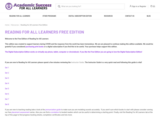
8 sets of free decodable books (TONS of free books in total!). Each book includes the sounds needed to read the book, as well as example key words with that sound.
*Be sure to read the instructor's guide before you get started!
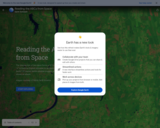
Using NASA's satellite imagery students can hunt for letters in Earth's landforms from space!

One of the most successful business models is the franchise, but it didn't originate with McDonald's. Sir Harold Evans describes the remarkable story of a beauty salon that allowed hundreds of women to own their own businesses. A quiz, thought provoking question, and links for further study are provided to create a lesson around the 5-minute video. Educators may use the platform to easily "Flip" or create their own lesson for use with their students of any age or level.

In this lesson, students consider the ways in which misinformation can have an impact on history and politics. After discussing a number of historical examples of misinformation, they examine the ways in which news sources may be biased and use an interactive online game to practice skills in getting more context on a story. Finally, students read a current news story and use what they have learned to find the context they need to understand it.

In this lesson, students start by considering the wide range of science and health information they are likely to encounter in news or through social media. They read an article on a scientific topic to help them understand the particular challenges of verifying science and health information and then use an educational computer game to practice skills in critically reading health and science stories. Finally, students compile a list of reliable sources they can turn to for verifying health and science stories.

In this lesson, students consider the meanings of the term “fake news” and learn facts about the news industry that will help them recognize legitimate sources of news. They use an educational computer game to learn how to track a news story to its original source before evaluating its reliability, then practice the same skills “in the wild” with actual news stories.

In this lesson, students consider the ways in which our own biases can prevent us from being objective. They then learn ways to recognize and account for our biases and practice these by playing an interactive online game. Finally, students learn about how public service campaigns can change social norms and create their own PSA to promote ethical sharing of online information.

After examining recipes written based on students' favorite fairy tales, students research a recipe related to their favorite story, book, or fairy tale and include it in a classroom recipe book.

Reciprocal Teaching Comprehension Strategy Cue Card Poster

The Ontario Human Rights Commission’s Right to Read inquiry concluded that running records and reading level assessments have not been effective in identifying students who need additional support or in providing teachers with accurate information to guide instruction. We now know that there are more effective ways to understand student reading skills and ensure that students are receiving the instruction that they need. This handout highlights why reading levels should be reconsidered, and frames the who, what, when, and how of different purposes for assessment: screening, diagnostic, progress monitoring, and outcome evaluation.
This handout builds educator knowledge of effective assessment practices to support explicit and systematic instruction of foundational reading skills.
References:
Burns, M.K., Pulles, S.M., Maki, K.E., Kanive, R., Hodgson, J., Helman, L.A., McComas, J.J., & Preast, J.L. (2015). Accuracy of student performance while reading leveled books rated at their instructional level by a reading inventory. Journal of School Psychology, 53(6), 437 – 445.
Ontario Human Rights Commission. (2022). Right to read: Public inquiry into human rights issues affecting students with reading disabilities. https://www.ohrc.on.ca/en/right-to-read-inquiry-report/introduction
Parker, D.C., Zaslofsky, A.F., Burns, M.K., Kanive, R., Hodgson, J., Scholin, S.E., & Klingbeil, D.A. (2015). A brief report of the diagnostic accuracy of oral reading fluency and reading inventory levels for reading failure risk among second- and third-grade students. Reading & Writing Quarterly, 31(1), 56 – 67.